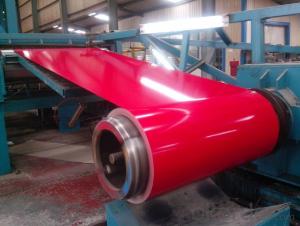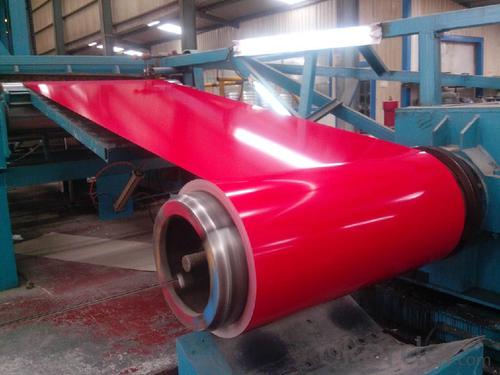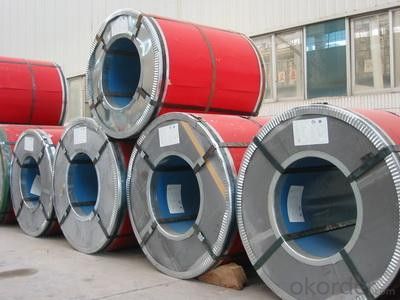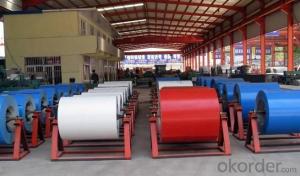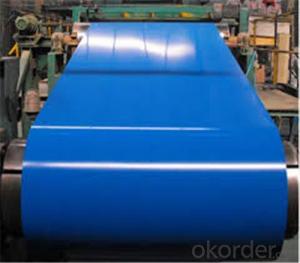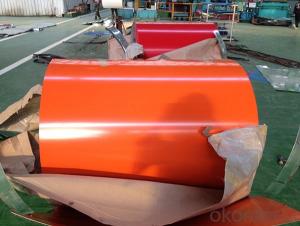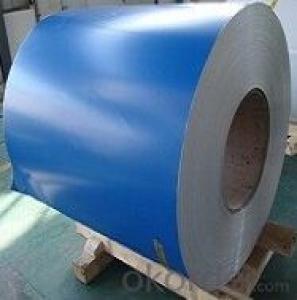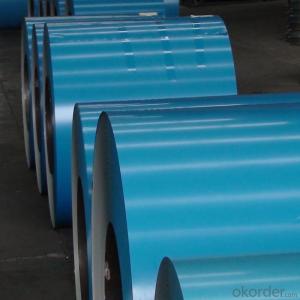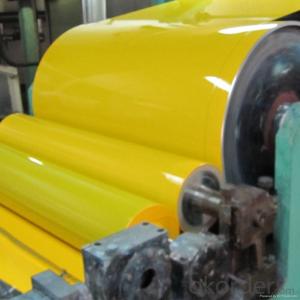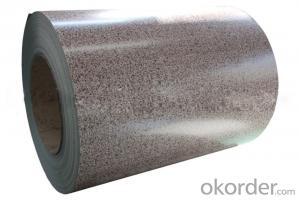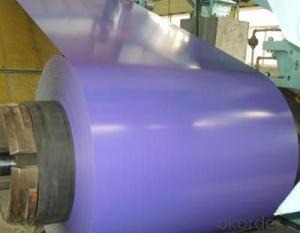Prepainted aluminum zinc rolled Coil For construction Roof
- Loading Port:
- Shanghai
- Payment Terms:
- TT OR LC
- Min Order Qty:
- 25 m.t.
- Supply Capability:
- 30000 m.t./month
OKorder Service Pledge
OKorder Financial Service
You Might Also Like
Structure of Aluminum Zinc Rolled Coil
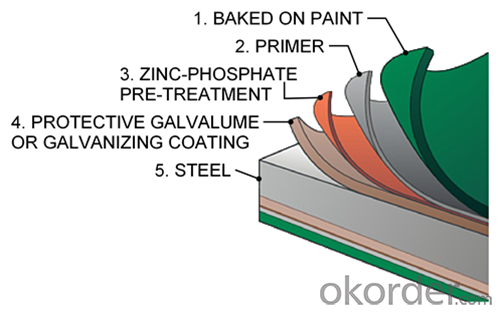
Description of Aluminum Zinc Rolled Coil
Aluminum zinc coils is a kind of coated steel coil/sheet. With the cold rolled steel of different strength and thickness as substrate, it is produced through applying Al-Zn coat on both faces by hot dip process. In its coating, Al accounts for about 55%, Si 1.6%, while the remaining is Zn. Aluminum zinc coils enjoys both the physical protective feature and durability of Al and the electrochemical protective property of Zn. And its surface has bright silver color and regular embossed-like figure, which are highly decorative.
Main Feature of Aluminum Zinc Rolled Coil for Construction Roof
1.Corrosion resistance: It mainly depends on the aluminum protection. When the zinc being worn, the aluminum will form a dense layer of aluminum oxide, resist corrosion material to prevent further corrosion inside.
2. Heat resistance: Aluminum zinc alloy steel sheet has excellent heat resistance, can withstand high temperatures over 300 centigrade, and is similar with aluminized steel high temperature oxidation resistance. It often used in chimney pipes, ovens, fluorescent lighting device and the device cover.
3. Heat reflective: Galvanized steel plate heat-reflective high rate is twice as galvanized steel, often used to make insulation materials.
4. Economy: Because density of 55% AL-Zn is smaller than the density of Zn, so in the same weight and thickness of Galvanized zinc layer, aluminum-zinc steel plate is larger area more than 3% of galvanized steel sheet.
Applications of Aluminum Zinc Rolled Coil for Construction Roof
1. Construction and building: roofing; ventilating duct; handrail; partition panel;etc.
2. Electric appliance: refrigerator; washing machine; refrigerator; DVD;etc.
3.Transportation: oil tank; road sign; etc.
4.Agriculture:barn; etc.
5.Others:vending machine; game machine; etc.
Specifications of Prepainted Aluminum Zinc Rolled Coil for Construction
Product | Hot Dipped Galvanized Steel Coil / Galvalume /Aluzinc Steel coil |
Material Grade | SGCC / SGCH / DX51D+AZ, etc |
Thickness | 0.2-3.0mm |
Width | 600-1500mm |
Tolerance | Thickness: +/-0.02mm , Width:+/-2mm |
Zinc-coating | AZ40-150g/m2 |
Technique | Raw material: Hot rolled steel coil --> Cold rolled_>hot dipped galvalume |
Surface | Dried, Chromated, Unoiled |
Spangle | Regular spangle , small spangle, zero spangle |
ID | 508MM |
Coil weight | 3-6 tons |
Export package | Cardboard inner sleeves, Waterproof paper, galvanized steel covered and steel strip packed |
FAQ of Prepainted Aluminum Zinc Rolled Coil for Construction
We have organized several common questions for our clients,may help you sincerely:
1. What is the minimum order quantity ?
Our MOQ is 50mt for each size. And we will consider to give more discount if you make big order like 1000 tons and more. Further more, the more appropriate payment term your offer the better price we can provide.
2. How long can we receive the product after purchase?
Usually within thirty working days after receiving buyer’s advance payment or LC. We will arrange the factory manufacturing as soon as possible. The cargo readiness usually takes 15-25 days, but the shipment will depend on the vessel situation.
3. How to guarantee the quality of the products?
We have established the international advanced quality management system,every link from raw material to final product we have strict quality test;We resolutely put an end to unqualified products flowing into the market. At the same time, we will provide necessary follow-up service assurance.
- Q: im buying a new guitar,, it has a built in tuner and its semi acoustic (can be plugged into an amplifier) ,, im trying to choose which strings are better ,, steel or nylon..?
- i have steel and i like the way it sounds but i like nylon better
- Q: How does the thickness of a steel coil affect its applications?
- The thickness of a steel coil has a significant impact on its applications. The thickness determines the strength, durability, and versatility of the steel, making it suitable for various uses across different industries. In applications where strength is crucial, such as the construction industry, thicker steel coils are preferred. Thicker coils provide higher structural integrity and load-bearing capacity, which is essential in buildings, bridges, and infrastructure projects. Thicker steel coils also offer better resistance to bending, warping, and other forms of deformation, making them ideal for heavy-duty applications. The thickness of a steel coil also affects its durability. Thicker coils have a higher resistance to wear, corrosion, and damage, making them suitable for harsh environments or applications that involve constant friction or exposure to elements. For example, thicker steel coils are commonly used in manufacturing heavy machinery, automotive parts, and mining equipment, where durability is paramount. Furthermore, the thickness of a steel coil determines its versatility and adaptability. Thinner coils can be easily formed into different shapes and sizes, making them suitable for applications that require intricate designs or tight tolerances. Industries such as automotive, aerospace, and consumer electronics often rely on thinner steel coils for their lightweight and flexible nature. On the other hand, thicker steel coils may limit the range of applications due to their weight and reduced flexibility. They are more suitable for applications that prioritize strength and durability over versatility. These applications include structural components, large-scale machinery, and industrial equipment. In summary, the thickness of a steel coil plays a crucial role in determining its applications. Thicker coils offer increased strength, durability, and resistance, making them ideal for heavy-duty applications in construction and manufacturing industries. Thinner coils, on the other hand, provide versatility and adaptability, making them suitable for applications that require intricate designs or lightweight properties.
- Q: What are some of the greatest steel guitar songs in the history of country music. Western swing applies also.
- Bob okorder /
- Q: How are steel coils used in the production of metal cladding?
- Steel coils are used in the production of metal cladding as they are rolled into flat sheets and then formed into various shapes and profiles. These coils provide the raw material for manufacturing metal cladding panels, which are widely used in construction for their durability, weather resistance, and aesthetic appeal.
- Q: where can i get a thick sheet of steel ? and is steel bullet proff for example if you shoot a bullet on steel will that bullet bounce right off the steel ?
- Try a local Fastenal store, they can order it for you by the sheet. If that doesnt help, then try a welding or fabricating store.
- Q: How are steel coils inspected for defects after recoiling?
- Steel coils are inspected for defects after recoiling through a thorough visual examination, which involves inspecting the surface for any visible defects such as scratches, dents, or cracks. Additionally, non-destructive testing techniques like ultrasonic or magnetic particle inspection may be used to identify any internal defects that are not visible to the naked eye.
- Q: How are steel coils used in the manufacturing of automotive doors?
- Steel coils are used in the manufacturing of automotive doors by being shaped and cut into the desired size and shape for the door panels. These coils are then formed into the appropriate curvature and attached to the door frame, providing strength, rigidity, and durability to the door structure.
- Q: case hardening steel is adviced or thru hardening steel is most suitable?
- I don't know your application, but here is some advice. Case hard provides a hard shell around soft steel, depending on the bake, the case is usually .002-.008 thick. (thousands of an inch) Heat treated steel or tool steel is hard all the way thru. Case hardening, provides toughness with flexibility, however, once it's compromised, the part is scrap. Hardend tool steel is extreemly hard throughout and the harder it is, the more brittle it becomes. The application of the part will help you to determine the material needed. For instance; Plastic injection molds are very hard so the hot plastic wont erode them over years of use. Punch Press dies aren't as hard but are tougher to withstand the shock. Machine bolts are case hardened so they can last, but soft enough to allow some stretching during tightening. Either way, the time in mfg will be about the same. Most tool steels today cut like cheese, but take time to be heat treated. Tool steel will cost a bit more than low carbon steel. Low carbon steel is as machinable, and cheaper, but, again, the baking period is as long or longer than tool steel. There are a lot of materials on the market today that maintain the durability of heatreated steel without having to go thru that process. 4140, ( or chrome/moly) comes to mind. There are also some 400 series stainless that work as well, and others. You need to determine strength, flexibility, ease of mfg, cost and repairability when considering which steel to use.
- Q: How do steel coils contribute to energy efficiency?
- Steel coils contribute to energy efficiency in several ways. Firstly, steel is a highly efficient material for conducting and storing heat, making it an ideal choice for various energy-efficient applications. Steel coils are commonly used in heating, ventilation, and air conditioning (HVAC) systems, where they help transfer heat efficiently and maintain optimal indoor temperatures. Additionally, steel coils are utilized in the production of energy-efficient appliances, such as refrigerators and freezers, where they aid in preserving and regulating temperatures while minimizing energy consumption. Lastly, steel coils are often employed in renewable energy technologies, including solar and wind power systems, where they play a crucial role in the generation, storage, and transmission of energy. Overall, steel coils contribute to energy efficiency by enhancing heat transfer, optimizing temperature control, and supporting sustainable energy solutions.
- Q: which cost more: ALLOY, GUNMENTAL OR STAINLESS STEEL. GIVE ME AN IDEA OF THE COST OF EACH.
- Titanium alloy is. Its the hardest metal in the world and takes about 6 months to produce. I sell titanium juliets for 350.
Send your message to us
Prepainted aluminum zinc rolled Coil For construction Roof
- Loading Port:
- Shanghai
- Payment Terms:
- TT OR LC
- Min Order Qty:
- 25 m.t.
- Supply Capability:
- 30000 m.t./month
OKorder Service Pledge
OKorder Financial Service
Similar products
Hot products
Hot Searches
Related keywords
